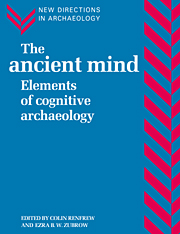Book contents
- Frontmatter
- Contents
- List of figures
- List of tables
- List of contributors
- Preface
- PART I INTRODUCTION
- PART II THE INTERDISCIPLINARY UNDERPINNING
- PART III APPROACHES TO CULT PRACTICE AND TRANSCENDENTAL BELIEF SYSTEMS
- PART IV PREHISTORIC CONCEPTIONS OF SPACE AND TIME
- PART V THE MATERIAL BASIS OF COGNITIVE INFERENCE: TECHNOLOGY
- 13 Cognitive aspects of ‘technique’
- 14 Mindful technology: unleashing the chaîne opératoire for an archaeology of mind
- 15 Prehistoric technology: a cognitive science?
- PART VI THE MATERIAL BASIS OF COGNITIVE INFERENCE: WRITING SYSTEMS
- PART VII CONCLUSION
- Index
14 - Mindful technology: unleashing the chaîne opératoire for an archaeology of mind
Published online by Cambridge University Press: 03 December 2009
- Frontmatter
- Contents
- List of figures
- List of tables
- List of contributors
- Preface
- PART I INTRODUCTION
- PART II THE INTERDISCIPLINARY UNDERPINNING
- PART III APPROACHES TO CULT PRACTICE AND TRANSCENDENTAL BELIEF SYSTEMS
- PART IV PREHISTORIC CONCEPTIONS OF SPACE AND TIME
- PART V THE MATERIAL BASIS OF COGNITIVE INFERENCE: TECHNOLOGY
- 13 Cognitive aspects of ‘technique’
- 14 Mindful technology: unleashing the chaîne opératoire for an archaeology of mind
- 15 Prehistoric technology: a cognitive science?
- PART VI THE MATERIAL BASIS OF COGNITIVE INFERENCE: WRITING SYSTEMS
- PART VII CONCLUSION
- Index
Summary
La technologie doit d'abord é vécue, pensée ensuite si le besoin s'en fait encore sentir.
André Leroi-Gourhan (1945: 10)Introduction
Far from being irremediably incapacitated by the inadequacies of the excavated record, an archaeology of the ancient mind is possible, and quite capable of generating new and interesting knowledge about its subject matter. With their in-depth specialization in the recovery, analysis and interpretation of material culture and of technological remains, archaeologists are, in fact, situated in a unique position from which to make original and consequential contributions to the sciences of the human mind. Let me initiate a discussion of this potential with the following proposition: there are non-trivial relations between the material actions that humans undertake, and their minds in action. It is on the reality or the viability of such a proposition that an archaeology of the mind (the way I see it) will hinge. After all, most of our evidence from the past consists of remains of material actions; if these remains, appropriately studied, cannot somehow inform us on the ancient mind, what other means - short of empathy - will do?
My proposition does not stem solely from an attitude of resigned necessity, whereby we must do with what we have. I contend that even if, transported back in time, we could actually observe a Palaeolithic band in vivo, it would be highly informative and rewarding to study their ubiquitous material actions and products in their ‘natural’ setting.
- Type
- Chapter
- Information
- The Ancient MindElements of Cognitive Archaeology, pp. 143 - 151Publisher: Cambridge University PressPrint publication year: 1994
- 63
- Cited by

